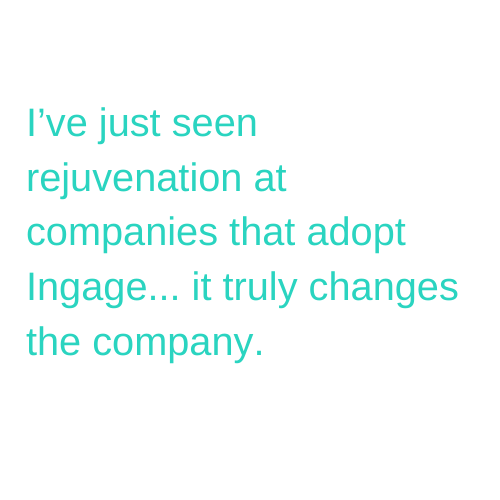How Small Businesses Can Find Success After Covid
Small businesses in the home improvement industry saw a huge increase in demand throughout the pandemic, but to find success after COVID, they need to think differently. Enter Chuck Thokey, professional speaker and sales trainer in the home improvement industry. He brings over 20 years of sales experience and has built his own sales methodology to help small businesses find success in larger markets. We sat down with Chuck to learn how he incorporates Ingage into his process and what he thinks businesses can do to grow long after the pandemic is over.
Ingage: You’ve spent the past 20 years building a reputation as an expert in sales training. We’re curious, what led you down this path?
Chuck Thokey: Being in sales management for so long, I’ve always loved helping everyone so I started to speak and coach on the side. After some time, I decided I wanted to go ahead and start coaching and speaking professionally and I have to say, it worked out pretty well. To date, I’ve worked with several hundred contractors. It’s a great feeling to be a small part of many companies' extreme success over the past four years.
Ingage: We know your sales methodology plays a large role in helping businesses achieve success.How would you describe your methodology?
CT: It’s based on the core problem that so many companies do not know how to grow. You see a “mom and pop” company that reaches $1-2 million in annual revenue. They think it’s enough until they find out about the larger world, that $10-20 million annual revenue mark. Where I come in is to help these smaller businesses get into the larger game so that the owners can start taking a hands off approach and enjoy the fruits of their labor. I focus on showing them how they’re different and how they can use those unique qualities to grow their business.
Ingage: How does Ingage fit in with this sales methodology of emphasizing the unique aspects of a business?
CT: Ingage allows them to compete against larger companies who haven’t adopted something as different as Ingage. It sets a small company apart from the larger competitors, which makes all the difference when they’re trying to double and even triple their business.
I love to show the company a PowerPoint and then bring out Ingage and see the platform just blow them away with its capabilities. Ingage is an important piece of the puzzle, bringing together the tools I share, plus the messaging through Ingage that they need to see results.
Ingage: Now, taking a step back, how did you come across Ingage and what made it different from other solutions you may have been looking at?
CT: I originally found Ingage through Nick Richmond at Grosso University. He had nothing but amazing things to say about the platform and once I got my hands on it, I knew why.

I wasn’t necessarily looking for a new solution, but I was swayed from PowerPoint thanks to the overwhelming benefits and features Ingage has. The biggest thing was video - presentations today need interactivity, not just some static picture. Knowing I could play a video inside of the platform instead of bouncing around to different browsers and sites was huge.
I also think the ability to be interactive plays into my sales methodology of providing a different experience for customers. Plus, the analytics are second-to-none. It’s like riding with a rep without actually getting in the truck with them. I can look at my sales team and see the pages they’re on most often and the ones they skip over. Then, I can take this data and determine if there’s a page I can get rid of or a rep that needs to be retrained. It makes all the difference as a sales manager.
Ingage: We love the analytics feature as well, they provide so many valuable insights. Looking back at onboarding with Ingage, what was that like? Was there a big learning curve?
CT: I don’t think there was a big learning curve at all, it’s a pretty easy to understand platform especially if you use other software tools. The onboarding was simple and fast, although my biggest hurdle was the design aspect. You can absolutely create your own presentation and easily make it look good, but to make it really pop, I felt the need to bring in a designer. Having a designer to go in and draft templates made it so that I could really enjoy the platform and update information without having to build out my own designs.

Ingage: Thinking about the work you put into getting Ingage up and running, what has been the biggest indicator of success for Ingage when it comes to evaluating your ROI?
CT: I look a lot at the one-call close and the total closing percentages. Is the needle moving at all once implementing Ingage and is it really pushing the homeowner to buy? I also consider what it’s doing for the management team to help manage their people. Is it helping them cultivate stronger reps and higher sales or are they struggling? And that’s where a lot of those in-platform analytics come into play.
Ingage: That’s a great way to look at it. Any success stories you can share with us?
CT: Overall, I’ve seen rejuvenation at companies that adopt Ingage. It’s almost like a new toy for them to play with– it truly changes the company, their perception and motivation when they’re doing in-home sales. Plus, I’ve seen 50-80% more sales month-to-month when companies have combined Ingage with sales training.
Ingage: Wow, those are amazing numbers! Are you still seeing those results when it comes to training and selling during the COVID-19 pandemic?
CT: It’s kind of weird but COVID didn’t hurt the home improvement industry, it actually helped. I’m seeing companies - small to large - looking at double, even triple, the business they had before the pandemic. A lot of that comes down to people being at home more and realizing they need a fresh space.
Ingage: With the industry exploding, what can small businesses do to take advantage of the extra demand they’re seeing?
CT: A lot of the smaller businesses I work with are seeing a huge influx in consultation requests, giving them a real chance to have massive growth and compete with the larger companies. My best recommendation is for these companies not to take any more work than they can handle. My second best recommendation is to take some of the extra money they’re making and invest it to grow the company. Whether that’s adopting Ingage, hiring a consultant or more staff, they need to use this opportunity to grow for the future.
To learn more about Chuck Thokey and his training method, visit www.mycoachchuck.biz
